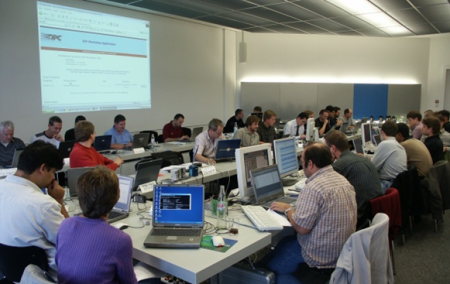 Our Certification Test Lab has been busy the last several months. Due to the increasing demand for certification testing we moved the Certification Test Lab to our new facility located in Göppingen, near Stuttgart, Germany. The new facility allows us to expand our testing capabilities to deal with the increased demand. With this change we are now able to certify multiple products in parallel. This is important since we are getting additional load for Information model testing from Companion Specifications. The testing procedure for MDIS has just recently been completed and we are already scheduling testing for products which are making use of this specification.
Our Certification Test Lab has been busy the last several months. Due to the increasing demand for certification testing we moved the Certification Test Lab to our new facility located in Göppingen, near Stuttgart, Germany. The new facility allows us to expand our testing capabilities to deal with the increased demand. With this change we are now able to certify multiple products in parallel. This is important since we are getting additional load for Information model testing from Companion Specifications. The testing procedure for MDIS has just recently been completed and we are already scheduling testing for products which are making use of this specification.
The lab has been very busy testing OPC UA servers & clients but we have also certified several Classic servers & clients. Especially in the Asian market, Classic OPC still has a wide adoption and new products based on this technology are being released. Europe and North America markets are more focused on bringing OPC UA into all varieties of products. Especially in the IIoT arena, the number of certification requests for OPC UA Client integrations has increased. We are also noticing a growing demand for certification of HMI / SCADA Systems which usually have both Classic OPC and OPC UA Interfaces implemented. This enables them to gain data from data sources via older and newer OPC systems and also to provide this information to the MES/ERP above them.
We have also certified a Nano-Embedded Device Server Profile which was integrated in a sensor. But the majority of products coming for certification testing are still all different sizes of PLCs which are usually implementing either an embedded UA server profile or a Micro-Embedded Device Server Profile. We are always working closely with vendors to help ensure that their product is in a compliant state. We are very happy to announce that all the products which finished the certification process in the last 12 months have successfully passed certification!
— Alexander Allmendinger
Test Lab Director, Europe
 As I’m writing this note I’m watching the magnificent display of sheer force that mother nature can expend. A volcano cannot be stopped, but it can be prepared for. Do to this preparation there has only been property damage here on Hawaii and no loss of life. The same applies to the products vendors make, if they are well-built and certified, they have a much better chance of working as intended. With OPC UA being used in more and more critical applications, certification becomes ever more important. We are always striving to improve the certification process. The OPC Foundation issues a survey to all vendors that have completed testing in any of the OPC Foundation accredited labs. This survey allows us to check on the labs and to assess them. The respondents all report that they would return to the lab to test additional products and overwhelmingly are very happy with the professionalism of the lab. More than 80% felt the lab improved the quality of their product. One respondent included the following quote:
As I’m writing this note I’m watching the magnificent display of sheer force that mother nature can expend. A volcano cannot be stopped, but it can be prepared for. Do to this preparation there has only been property damage here on Hawaii and no loss of life. The same applies to the products vendors make, if they are well-built and certified, they have a much better chance of working as intended. With OPC UA being used in more and more critical applications, certification becomes ever more important. We are always striving to improve the certification process. The OPC Foundation issues a survey to all vendors that have completed testing in any of the OPC Foundation accredited labs. This survey allows us to check on the labs and to assess them. The respondents all report that they would return to the lab to test additional products and overwhelmingly are very happy with the professionalism of the lab. More than 80% felt the lab improved the quality of their product. One respondent included the following quote:
”The independent testing of all facets of the product, not only the pure compliance, increases the overall robustness and stability. In combination with conformity to the OPC UA Specification, the certification test is a valuable statement and provides real confidence for the supplier, but even more important, for the system integrators and the users of the technology.”
To extend this quality beyond the base OPC specifications, we are working with other organizations such as Open-SCS, PackML, and PLCOpen to establish certification for these companion specifications. We are also working with new working groups, such as MTConnect, the Open Process Automation Forum (OPAF) and new VDMA working groups to ensure that they also are addressing Certification. The key point is to ensure that the functionality described in a companion specification includes a list of Conformance Units and Profiles. The breakout of functionality into Conformance Units allows for the development of a set of matching certification test cases. Many of these test cases are then automated into the Conformance Test Tool (CTT) allowing semi-automated testing of the information model.
 To further help vendors, the OPC Foundation hosts Interoperability events (IOP). The OPC Asia IOP just occurred on June 20-22 in Tokyo. The IOPs are highly valued by OPC Foundation members to validate their products’ interoperability with other companies’ products. Vendors can work closely to validate the interoperability of their OPC products across regional boundaries. We typically see companies from outside of a region actively participating in these workshops. More information about InterOps can be found here.
To further help vendors, the OPC Foundation hosts Interoperability events (IOP). The OPC Asia IOP just occurred on June 20-22 in Tokyo. The IOPs are highly valued by OPC Foundation members to validate their products’ interoperability with other companies’ products. Vendors can work closely to validate the interoperability of their OPC products across regional boundaries. We typically see companies from outside of a region actively participating in these workshops. More information about InterOps can be found here.
Interested in being part of the important certification strategy? We are always looking for volunteers to help us make the OPC Foundation certification and process work for you! Please contact us at Compliance_AT_OPCFoundation.org
— Paul Hunkar
Compliance Director, OPC Foundation